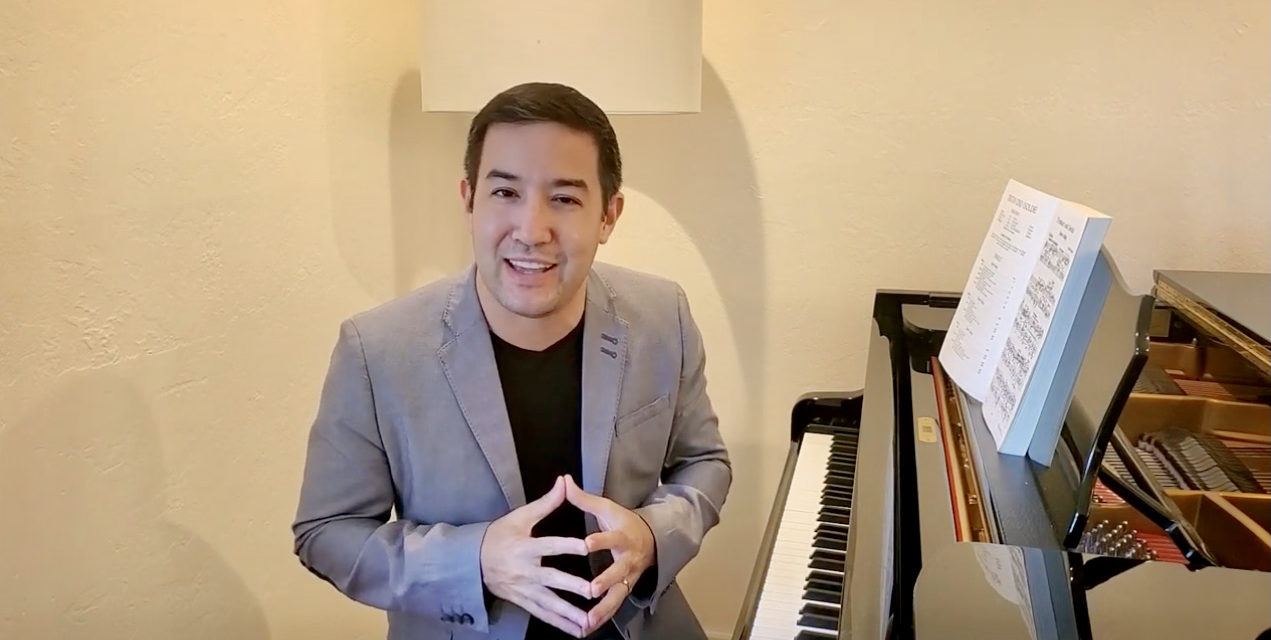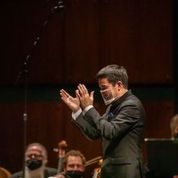(Above: Eugene Symphony conductor Francesco Lecce-Chong is the mastermind behind a three-season plan to perform the whole of Richard Wagner’s five-hour opera, Tristan und Isolde.)
By Randi Bjornstad
Eugene Symphony continues its unusual presentation of Richard Wagner’s masterpiece, Tristan und Isolde, with Act II on Nov. 17 at the Hult Center for the Performing Arts.
Unusual, because Act I occurred earlier this year, in April Act II is now in November, and Act III waits in the wings for its turn in 2023.
Here’s how Eugene Scene described the situation before the performance of Act I:
Richard Wagner’s epic opera, Tristan und Isolde, is not performed all that often for several good reasons: the three-act opera in its entirety takes about five hours to perform; it’s so demanding that few singers are up to the task; and very few orchestras dare take on the whole daunting thing.
But Francesco Lecce-Chong, music director and conductor of the Eugene Symphony, has a plan to bring the entirety of Tristan und Isolde to the Eugene stage — one act at a time over three seasons — beginning now, with its April 21, 2022 concert.
“I only know of a couple of orchestras that ever have done the whole opera,” Lecce-Chong said. “Many just do Act II as a concert piece. Each act is a self-contained epic so it can be performed alone, but I don’t know of anyone who is doing what we are doing. I feel that this is a Eugene-only project, and I couldn’t be more excited.”
As far as he knows, this is only the second time this opera has been performed in Oregon, and the first time was in Portland “some 50 years ago,” Lecce-Chong said. “I started working on this quite awhile ago, finding the right singers, because there are very few who can do these parts.”
If you didn’t happen to see Act I in April, don’t worry. You can read a synopsis of all three acts in Wagner’s opera below.
But before you get there, here are a few more details about Act II. The same singers who performed the title roles in Act I are back, with Nina Warren as Isolde and Roy C. Smith as Tristan. Ola Rafalo again is Isolde’s maid, Brangäne, and Gary Simpson sings the role of Kurwenal, Tristan’s servant.
Before Act II of Tristan und Isolde, the symphony will perform French composer Lili Boulanger’s D’un matin de printemps, a morning in Spring.
Eugene Symphony: Tristan und Isolde
When: 7:30 p.m. on Thursday, Nov. 17, 2022
Where: Silva Concert Hall, Hult Center for the Performing Arts, One Eugene Center (7th and Willamette streets), Eugene
Tickets: $10 to $65, available at the Hult Center box office, 541-682-5000, or online at eugenesymphony.org or hultcenter.org
Synopsis of Tristan und Isolde

A slim volume of descriptions of opera plots, orignally compiled by composer Felix Mendelssohn; photo by Randi Bjornstad
Of course there are many synopses of the long and involved plot line of Tristan und Isolde, but one of particular interest comes from a pocket-sized book called The Story of a Hundred Operas and subtitled, Invaluable to Radio Listeners.
The tiny volume was compiled originally by composer Felix Mendelssohn, who described it as “not intended in any way to be a serious literary production, but as an endeavor to present to the opera-loving public in clear and concise form, the plots of the operas, with mention of the principal arias as they occur.”
It was published first in 1913 — long after Mendelssohn’s death in 1847 at age 38 — by Grosset & Dunlap, Inc., in New York City, and re-released in 1940. Various newer versions are still in publication.
Act 1
The deck of a Vessel. Tristan, the knight, is bringing Isolde from Ireland to Cornwall to become the bride of King Mark, she having accepted his proposal, made through Tristan. The sailors are joyous over the killing of Marold by Tristan, the former being the betrothed of Isolde. The deed has freed Cornwall from the domination of Isolde’s father. Isolde, on the threshold of a loveless match, is attracted by Tristan whom she alternately loves and hates. Finally she decides that he shall die by poison and that she will die with him. She orders Brangaene to prepare the drug. But the faithful friend, dreading to see the Princess perish, prepares a love potion instead. This Tristan and Isolde drink. They are amazed and then embrace each other in ecstasy just as the ship reaches the shores of Cornwall.
Act 2
Garden of the Palace. The King has left his bride and gone on a hunting expedition But Brangaene tells Isolde that the King’s departure is a ruse and that the Princess is being watched by the courtier Melot. She tells Isolde, too, about the substitution of the love potion for poison. “Fatal folly.” But Isolde does not rebuke her, nor does she heed her warning about the crafty Melot. She declares that love’s goddess was instrumental in her drinking the love draught, “They act.” Tristan, signaled to by Isolde, finds the Princess and they are oblivious to everything except each other and their happiness. Kurwenal, Tristan’s friend and servant, arrives to warn him of the danger. But it is too late now, for Melot and the King surprise the lovers. The King bitterly reproaches his nephew but despises the low trickery of Melot. Tristan draws his sword on the courtier but in the fight Melot inflicts a fatal wound.
Act 3
Interior of Tristan’s Castle in Brittany Here the wounded knight has been brought by Kurwenal. Isolde has been sent for to use her healing arts in restoring Tristan to health. Her coming is announced from the ramparts. Tristan, delirious, tears off his bandages in his effort to go to Isolde. As she reaches him he dies in her arms. Following her come King Mark and Melot. The King has come to reunite the lovers But Kurwenal, thinking they have come to kill and not to heal, attacks them. He slays Melot and is himself slain by Melot’s soldiers. King Mark finds Isolde dying of grief by the dead Tristan, Isolde’s death song: “Mild and softly he is smiling,” As she expires King Mark prays over her body.








